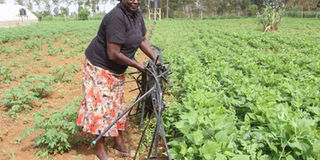Want to beat the harsh weather? Here are the ways

Dorothy Emonyi arranges her drip irrigation pipes in their farm in Kakamega. Drip irrigation is a viable means of watering your crops especially during dry conditions. FILE PHOTO | NATION MEDIA GROUP
What you need to know:
- Choose crops and seeds depending on geographical areas.
- Plant fast-maturing crops, especially indigenous vegetables like spider plant and amaranths.
- Plant drought-tolerant crops which requires little water and matures fast.
- Water conservation strategies she advocates for include digging underground water tanks, mulching and use of zai pits
If you have a farm in a hilly place, plant crops that mature faster like vegetables.
And if your farm is in extremely dry areas, especially in low land, your are better off planting drought-tolerant crops.
This is the advise that Prof Mary Abukutsa-Onyango, a lecturer at Jomo Kenyatta University of Technology, Department of Horticulture, has been giving farmers in the wake of the dry spell that has hit crop production, thereby compromising food security.
She advises farmers to choose crops and seeds depending on their geographical areas.
Those who live in low lands can plant pumpkins, sorghum, millet, butternut, cassava, millet, green grams, and sorghum.
Others are African nightshade, cowpeas, slender leaf, and legumes such as bambara nuts.
The don says these crops are known to produce high yields even with little water.
Besides drought-resistant crops, Prof Onyango advises farmers to plant fast-maturing crops, especially indigenous vegetables like spider plant and amaranths.
And this advice is not just for farmers who rely on rain to water their crops. It also applies for those who engage in irrigation farming,
CROP DIVESIFICATION
Further, there are crops that have also been developed with climate resilience characteristics, such as drought-tolerant maize which requires little water and matures fast.
“Practising crop diversification to reduce the risk of loss by intercropping late and early maturing crops also helps. Farmers should also practice relay cropping helping them to harvest farm produce even when rains are not adequate.”
Relay cropping involves the growing of two or more crops on the same field, planting the second crop after the first one has completed its development.
Water conservation strategies she advocates for include digging underground water tanks, mulching and use of zai pits in growing crops like passion fruits, bananas watermelon and sweet potatoes.
John Wambugu, an agricultural officer at the Wambugu Agricultural Centre in Nyeri, notes that with the dryspell, irrigation is the only best way to grow crops.
“Farmers need to invest in irrigation systems that save water usage like drip.”
Besides installing irrigation systems, he adds farmers should also practice mulching.
“Mulching helps to ensure water is not lost during the day when the sun is extremely hot,” he says.





